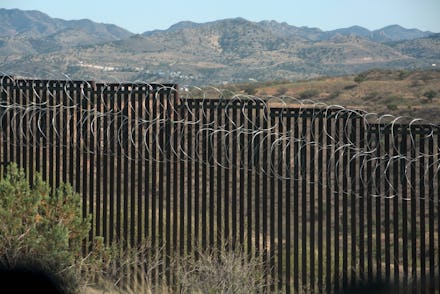Trump's mission to build the wall is threatening to drive people from their homes during a pandemic

When President Trump first began campaigning, one of his central promises was to build a border wall along the southern border. With the election less than a week away, Trump is bragging about his administration's efforts to build that wall to supporters. But there's one small detail Trump skips in his gloating: The Trump administration is rapidly filing lawsuits to seize land for the border wall, putting families at risk in the middle of the pandemic.
Earlier this week, the acting commissioner of Customs and Border Protection tweeted that the government is "on track to complete 450 miles of new border wall system by the end of the year!" And during a Wednesday rally in Arizona, Trump claimed, "Under my leadership, we have achieved the most secure border in U.S. history. We built almost 400 miles."
That's come at a cost, though. Per data from the Texas Civil Rights Project, a legal advocacy group, which was reviewed by CNN, the Trump administration filed 75 lawsuits to take private land in Texas between May and Oct. 22. Last year, there were only 17 lawsuits around the same time period, so this year's efforts mark a dramatic increase.
Now, yes, eminent domain means the government can take private land for public use, and it's something that the Trump administration has previously taken advantage of. However, Ricky Garza, a staff attorney at Texas Civil Rights Project, told CNN, "People right now are having to choose between their health and their homes."
"The government is choosing to sue people during a pandemic in one of the most vulnerable places in the United States," Garza continued. "If there was any sense of concern for the people of South Texas that went through one of the worst public health crises, none of these lawsuits would be filed after March 1, but here we are with dozens."
A big issue is that a lot of people targeted by these lawsuits are elderly. And while some court hearings can be virtual, it's not a given. So, as Garza pointed out, if the judge decides to hold hearings in person, that means members of a vulnerable population have to risk exposing themselves to coronavirus if they want to fight to keep their homes.
CNN reported that a CBP official said the administration is taking precautions, like talking over the phone instead of in-person. The outlet also said that some landowners have willingly turned over their land. But overall, the Trump administration doubling down on lawsuits in a pandemic is part of a larger trend.
Since starting this project, the Trump administration has treated the border wall as something that must be completed no matter the costs. Just look at the fact that the administration plans to build through multiple Carrizo/Comecrudo tribe burial sites. In August, the Kumeyaay Nation, whose youth have disrupted construction, sued the administration, stating border wall construction would cause "irreversible and easily avoidable damage to Kumeyaay remains, cultural items, history, and religious practices."
And while Trump has tried to paint the border wall as positive for the environment, in reality, it will cause a significant amount of damage. The U.S.-Mexico border runs through six separate eco-regions, and any wall will stop migrating animals and threaten those ecosystems. In short, the border wall is an ecological disaster.